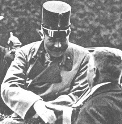Now that the border between Lebanon and Israel has changed from war zone to twilight zone -- an eerie landscape where the potential for renewed fighting hangs heavily in the air -- history's pundits can review their recent pronouncements on the conflict to see just how useful they proved. They can examine what they wrote to see how much it really helped us understand what just transpired in the Middle East and how effectively they guided the peacemakers in their search for a solution. A close look, I'm afraid, will show that history's lessons have proven confusing, contradictory and even misleading. The universal warning from philosopher George Santayana, that those who don't learn the lessons of history are doomed to repeat it, stands as one of the few lessons almost everyone remembers from history. Nothing awakens the historian-within more than the sight of war -- history in the making. And so, the latest conflict in the Middle East unleashed a stampede of real and would-be scholars eagerly scanning the past in search of relevant case studies to help us capture some valuable Santayanaesque lessons for Lebanon. If successful, their noble quest would have helped us learn, first, what mistakes the warriors, diplomats and statesmen (and women) were repeating from wars gone by and, secondly, what instructions the past held hidden, which, with the able talents of historians, we could unveil in order to forestall a repetition of the catastrophes of yesteryear.
Searching History for the Lessons of War

